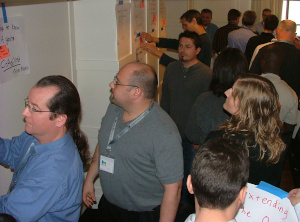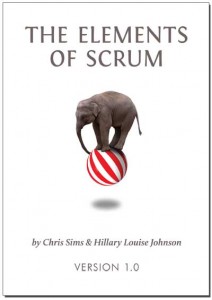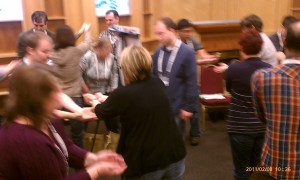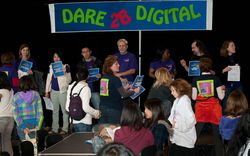 A great way to continue your agile learning journey is attending conferences. You’ll learn, build your professional network, and earn SEUs to renew your scrum certifications. To make the conference selection process easier, or harder, we’ve published the most complete list of scrum, agile, and agile adjacent conferences on the web.
A great way to continue your agile learning journey is attending conferences. You’ll learn, build your professional network, and earn SEUs to renew your scrum certifications. To make the conference selection process easier, or harder, we’ve published the most complete list of scrum, agile, and agile adjacent conferences on the web.
Read the full article…
Category Archives: conferences
Agile Conferences For 2021
This page is old. Checkout the best list of agile conferences on the web.
 I recommend conferences and MeetUps as a great way to learn, network, and earn Scrum Educational Units (SEUs). This past year was challenging for such events. Many were cancelled. Some managed to inspect and adapt, moving online.
I recommend conferences and MeetUps as a great way to learn, network, and earn Scrum Educational Units (SEUs). This past year was challenging for such events. Many were cancelled. Some managed to inspect and adapt, moving online.
I’m pleased to share our 2021 list of agile, and agile adjacent, conferences. It’s the largest list we’ve ever published.
Agile Conference List 2020
This page is old. Checkout the best list of agile conferences on the web.
Graduates of our workshops often ask how they can continue their journey of learning about scrum, and earn some Scrum Educational Units (SEUs). Attending conferences is a great way to accomplish these goals. Here is a list of conferences that you might consider attending in 2020. I’m sure we’ve missed some good ones, so point those out to us by leaving a comment.
Agile And Scrum Conference List 2019
This page is old. Checkout the best list of agile conferences on the web.
Graduates of our Certified Scrum Master (CSM), Certified Scrum Product Owner (CSPO), and Advanced Certified Scrum Product Owner (A-CSPO) workshops often ask how they can continue their journey of learning about scrum, as well as earn Scrum Educational Units (SEUs) to help them renew their Scrum Alliance certifications. Attending conferences is a great way to accomplish these goals. Here is a list of conferences that you might consider attending in 2019. I’m sure we’ve missed some good ones, so point those out to us by leaving a comment.
Read the full article…
Agile Games at Agile Open Southern California
Our very own Laura Powers recently participated in Agile Open Southern California, where she was interviewed by Scott Dunn. Laura talks about the power of games to help executives understand the changes they need to make in order for their organizations to become more agile.
The video was put together by Cliff Rosa of Rosa Media Productions.
Chris Sims is signing copies of The Elements of Scrum at the Atlanta Scrum Gathering on Tuesday
 If you are at the 2012 Atlanta Scrum Gathering, you got a copy of The Elements of Scrum by Chris Sims and yours truly in your conference goody bag, as we are proud sponsors of this year’s event. If you’d like Chris to sign your copy, he’ll be doing so at 12:30 pm on Tuesday in the Heritage Room. And I promise: if you bring along three rubber chickens, he will juggle them!
If you are at the 2012 Atlanta Scrum Gathering, you got a copy of The Elements of Scrum by Chris Sims and yours truly in your conference goody bag, as we are proud sponsors of this year’s event. If you’d like Chris to sign your copy, he’ll be doing so at 12:30 pm on Tuesday in the Heritage Room. And I promise: if you bring along three rubber chickens, he will juggle them!
What, you say you don’t yet have a copy of The Elements of Scrum and are consumed with envy? Easily solved! Take one of our CSM or CSPO classes and you’ll get one, or if you just can’t wait, buy yourself a copy here on Amazon. Makes a great Mother’s Day gift! Just kidding. That would be, like, the worst Mother’s Day gift of all time. If you need a Mother’s Day gift, buy her a copy of my mom Ricki Grady’s book, BeBop Garden instead.
Self-Organizing Ball Game at Agile Open Northwest
 Agile Open Northwest kicked off this morning, and the whole Agile Learning Labs crew is here. Chris hosted a session called “An Experiential Intro to Agile” in the first time slot. Sixteen folks new to agile gathered and we quickly discovered a common theme: participants were about to join agile teams, but didn’t know what to expect. Out came the rubber balls and we dove into the Self-Organizing Ball game.
Agile Open Northwest kicked off this morning, and the whole Agile Learning Labs crew is here. Chris hosted a session called “An Experiential Intro to Agile” in the first time slot. Sixteen folks new to agile gathered and we quickly discovered a common theme: participants were about to join agile teams, but didn’t know what to expect. Out came the rubber balls and we dove into the Self-Organizing Ball game.
The topics that this surfaced included:
- The value of short iterations to to allow productive “trial and error”
- How effective retrospectives generate continuous improvement
- Time-boxing can push a group towards productive chaos, while protecting it from prolonged unproductive chaos.
- The way a shared goal can unite a team, and focus the energy and self-organization
It was a lot of fun, and a good start to one of my favorite conferences.
Cheers,
The June Conference Circuit
If you're like us, you've dialed-back your conference-going in the past couple of years, but one event that's not to be missed is the Agile Roots Conference in Salt Lake City. Both Chris and Steve will be presenting, and we'll be handing out the very first "samplers" from our forthcoming Agile Dictionary project. Why do we love Agile Roots? Because it takes place in Salt Lake City, near the birthplace of the Agile Manifesto, and opens with a keynote address by Jeff Patton titled Nobody Wants Your Stupid Process. See, you want to go now, don't you?
What Does Your Team Need? Girl Power!

By Hillary Johnson
Last weekend, Chris and I attended a marvelous event called Dare 2B Digital, aimed at addressing the gender gap in computer science careers, and at which 7th through 10th grade girls got to play at writing code, crafting business plans, and other techie things.
Better Software = Agile Software
This year's Better Software Conference in Las Vegas on June 6-11 is all about Agile, to judge by the program. The conference runs concurrently with the Agile Development Practices West conference (with twofer admission). Better Software is also bookended by certification courses in ScrumMaster and Agile Testing Practices early in the week, and the Agile Alliance's one day Agile Leadership Summit , chaired by Polyanna Pixton, on Friday.
